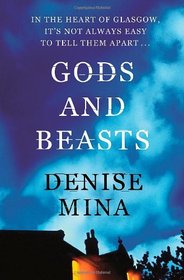You can always count on Denise Mina to tackle uncomfortable truths in her books, and she does it again in this third Alex Morrow mystery, Gods and Beasts. The framework of the book can be found in two quotes she uses. One from Abraham Lincoln: "Nearly all men can stand adversity, but if you want to test a man's character, give him power." The second from Aristotle: "Those who live outside the city walls and are self sufficient, are either Gods or Beasts." Gods and Beasts is the story of how some people abuse power, of how some people face the possibility of losing their jobs, of how the marginalized find themselves living from day to weary day.
Mina is a master at writing about the marginalized, at writing about the grit and grime of living "outside the city walls" of Glasgow, and I once again found myself immersed in Alex Morrow's world as she tries to solve this crime, deal with her co-workers, and be a wife and mother. Mina's world isn't always pleasant. The days are often overcast and gloomy, and violence can blindside you. But there's comfort in knowing that someone like Alex Morrow is on the job. That someone like Alex Morrow will keep fighting the bad guys with intelligence and determination.
There's a power to Mina's writing that you don't see every day. Take, for example, this one tiny scene that doesn't mean all that much in the scheme of things: "On the ground, by the side of the concrete front step, was a small ash tray, four half-smoked cigarettes laid out in a neat row, filters by filters, the burnt tips concertinaed. They made him think of diagrams of slave ships." This one small descriptive scene made this reader think of the smoker, so precise with those half-smoked cigarettes, so enslaved by an addiction to nicotine, but the scene keeps on giving. Diagrams of slave ships? My mind went on to think of people stolen from their homes, packed into filthy ships holds, and taken to work in tobacco fields. Of how slavery and poverty and drudgery grind people down.
It's a tiny scene with so much depth and power that it still takes my breath away, and it's one of the many reasons why I read Denise Mina's books. If you haven't, I hope you'll give them a try. As much as I enjoy Mina's Alex Morrow series, I found her Garnethill trilogy and her novels featuring Paddy Meehan to be excellent. Don't miss out on Denise Mina, one of the founders of Tartan Noir.
Mina is a master at writing about the marginalized, at writing about the grit and grime of living "outside the city walls" of Glasgow, and I once again found myself immersed in Alex Morrow's world as she tries to solve this crime, deal with her co-workers, and be a wife and mother. Mina's world isn't always pleasant. The days are often overcast and gloomy, and violence can blindside you. But there's comfort in knowing that someone like Alex Morrow is on the job. That someone like Alex Morrow will keep fighting the bad guys with intelligence and determination.
There's a power to Mina's writing that you don't see every day. Take, for example, this one tiny scene that doesn't mean all that much in the scheme of things: "On the ground, by the side of the concrete front step, was a small ash tray, four half-smoked cigarettes laid out in a neat row, filters by filters, the burnt tips concertinaed. They made him think of diagrams of slave ships." This one small descriptive scene made this reader think of the smoker, so precise with those half-smoked cigarettes, so enslaved by an addiction to nicotine, but the scene keeps on giving. Diagrams of slave ships? My mind went on to think of people stolen from their homes, packed into filthy ships holds, and taken to work in tobacco fields. Of how slavery and poverty and drudgery grind people down.
It's a tiny scene with so much depth and power that it still takes my breath away, and it's one of the many reasons why I read Denise Mina's books. If you haven't, I hope you'll give them a try. As much as I enjoy Mina's Alex Morrow series, I found her Garnethill trilogy and her novels featuring Paddy Meehan to be excellent. Don't miss out on Denise Mina, one of the founders of Tartan Noir.
A difficult read, because of all the Scottish language and ambiance. At times I felt like I was reading non-English and missing some of the subtler plot moves. However, I kept reading because Mina's characters are so fascinating. Even those who are the dregs of society have unusual and interesting inner lives. And by the way, the book has a terrific ending.




